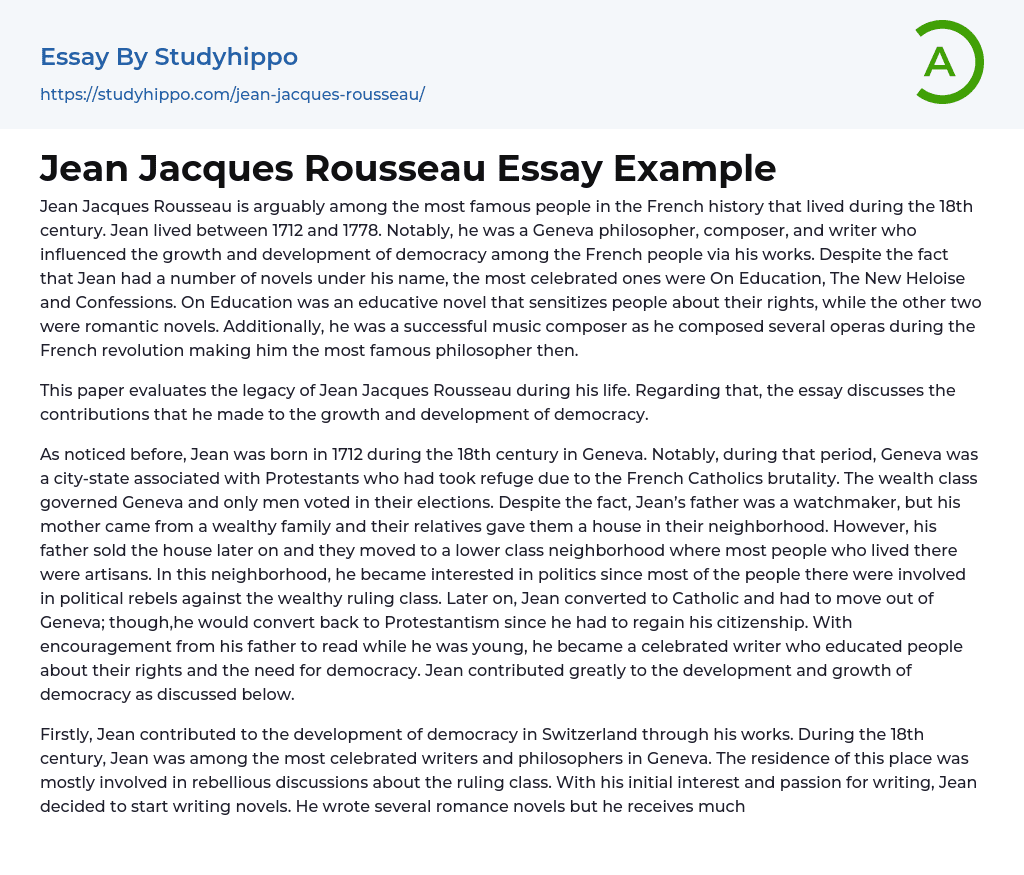Jean Jacques Rousseau, born in 1712 and died in 1778, was a philosopher, composer, and writer from Geneva who played a significant role in the advancement of democracy in France during the 18th century. His notable works include On Education, The New Heloise, and Confessions. While On Education promoted individuals' rights through its educational content, The New Heloise and Confessions were acclaimed romantic novels. Additionally, Rousseau excelled as a music composer and composed several operas during the French revolution. Consequently, he emerged as the most esteemed philosopher of his time.
This essay examines the impact of Jean Jacques Rousseau's legacy on democracy during his lifetime. It explores his contributions to the growth and development of democracy, specifically in Switzerland. Born in 1712 in Geneva, Jean witnessed a city-state that served as a sanctuary for Protestants fleeing from Frenc
...h Catholic persecution. The governance of Geneva was controlled by the wealthy elite, with only men having the right to vote in elections. Despite being the son of a watchmaker, Jean's mother came from a more affluent background, and they initially resided in a home provided by relatives. However, they eventually moved to a lower-class neighborhood occupied mostly by artisans. This relocation ignited Jean's interest in politics as this community actively opposed the ruling upper class. Although he briefly converted to Catholicism at one point, Jean later reverted back to Protestantism with the aim of regaining his citizenship rights. Inspired by his father's emphasis on reading, Jean became an esteemed writer who educated people about their entitlements and the significance of democracy. Through his literary works, Jean made notable contributions towards shaping and advancing democracy in 18th-century Switzerland. The
inhabitants of this area were extensively engaged in rebellious discussions concerning their rulership class. Motivated by his initial interest and love for writing, Jean chose to embark upon writing novels.
Jean Jacques Rousseau, the most renowned philosopher in Geneva during the 18th century, penned numerous romance novels. However, it was his enlightening novel titled Social Contract that gained him great recognition. This educational and insightful piece focused on democracy and its importance. It served as a guide for the lower class minority about their rights and fueled their desire to attain democracy in their state. Ultimately, they successfully achieved this goal.
Along with his fame, Jean contributed to the advancement of democracy through his positive influence on the community. He had an extensive following who eagerly embraced his guidance. Unlike those who might misuse their influence, Jean used his power for good. He advocated for democracy and advised both the people and rulers on its significance.
According to Jean, men should not have to give up their natural rights for a government's sake. He believed in a democratic method of electing leaders instead of an aristocratic form of governance. The people had the right to choose their leaders based on suitability rather than being imposed upon by an aristocratic government.
In addition to advocating for democracy, Jean led by example to inspire both the people and the government to emulate him. His application of democratic principles greatly influenced Swiss democracy's development.Despite facing opposition from Geneva's leadership, Rousseau's ideas were recognized as important and he was invited to provide recommendations for the constitution in 1772. The lower class, who were advocating for democracy, saw his books as a reflection of
their own aspirations. As a result, Rousseau was asked to share his thoughts on the new constitution and ensured that the virtue of democracy was incorporated into his recommendations. His contribution played a significant role in the development of democracy. One factor behind Rousseau's impact was his writings, particularly his influential novel "Social Contract," which educated the lower class about their rights. Additionally, he gained fame and exerted a positive influence on the community, further promoting democratic growth. Unlike others who might have exploited this advantage negatively, Jean harnessed his power of influence over democracy supporters by taking a positive approach.
- Nineteen Eighty-Four essays
- Maus essays
- Christina Rossetti essays
- Emily Dickinson essays
- Ernest Hemingway essays
- Percy Bysshe Shelley essays
- Robert Browning essays
- Robert Louis Stevenson essays
- Seamus Heaney essays
- Carol ann duffy essays
- Anne Bradstreet essays
- Elizabeth Bishop essays
- Peter Skrzynecki essays
- Poets essays
- Robert Frost essays
- Aldous Huxley essays
- Anton Chekhov essays
- Charles Dickens essays
- Edgar Allan Poe essays
- F. Scott Fitzgerald essays
- Harper Lee essays
- Homer essays
- Jane Austen essays
- John Steinbeck essays
- Kurt Vonnegut essays
- Mark Twain essays
- Mary Shelley essays
- Nathaniel Hawthorne essays
- Sophocles essays
- Stephen King essays
- William Shakespeare essays
- Zora Neale Hurston essays
- Amy tan essays
- Virginia woolf essays
- Alice Walker essays
- Chinua Achebe essays
- Sherman Alexie essays
- George Orwell essays
- Sylvia Plath essays
- T. S. Eliot essays
- W. H. Auden essays
- Wilfred owen essays
- William blake essays
- Kate Chopin essays
- Oscar Wilde essays
- Phillis Wheatley essays
- Ray Bradbury essays
- Richard Rodriguez essays
- Walt Whitman essays
- The Tempest essays




